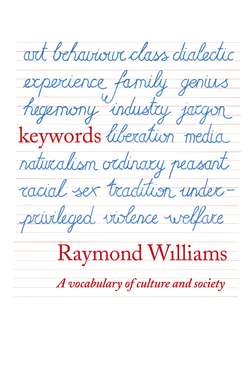Читать книгу Keywords: A Vocabulary of Culture and Society - Raymond Williams - Страница 21
CAPITALISM
ОглавлениеCapitalism as a word describing a particular economic system began to appear in English from eC19, and almost simultaneously in French and German. Capitalist as a noun is a little older; Arthur Young used it, in his journal of Travels in France (1792), but relatively loosely: ‘moneyed men, or capitalists’. Coleridge used it in the developed sense – ‘capitalists … having labour at demand’ – in Tabletalk (1823). Thomas Hodgskin, in Labour Defended against the Claims of Capital (1825) wrote: ‘all the capitalists of Europe, with all their circulating capital, cannot of themselves supply a single week’s food and clothing’, and again: ‘betwixt him who produces food and him who produces clothing, betwixt him who makes instruments and him who uses them, in steps the capitalist, who neither makes nor uses them and appropriates to himself the produce of both’. This is clearly the description of an economic system.
The economic sense of capital had been present in English from C17 and in a fully developed form from C18. Chambers Cyclopaedia (1727–51) has ‘power given by Parliament to the South-Sea company to increase their capital’ and definition of ‘circulating capital’ is in Adam Smith (1776). The word had acquired this specialized meaning from its general sense of ‘head’ or ‘chief’: fw capital, F, capitalist L, rw caput, L – head. There were many derived specialist meanings; the economic meaning developed from a shortening of the phrase ‘capital stock’ – a material holding or monetary fund. In classical economics the functions of capital, and of various kinds of capital, were described and defined.
Capitalism represents a development of meaning in that it has been increasingly used to indicate a particular and historical economic system rather than any economic system as such. Capital and at first capitalist were technical terms in any economic system. The later (eC19) uses of capitalist moved towards specific functions in a particular stage of historical development; it is this use that crystallized in capitalism. There was a sense of the capitalist as the useless but controlling intermediary between producers, or as the employer of labour, or, finally, as the owner of the means of production. This involved, eventually, and especially in Marx, a distinction of capital as a formal economic category from capitalism as a particular form of centralized ownership of the means of production, carrying with it the system of wage-labour. Capitalism in this sense is a product of a developing bourgeois society; there are early kinds of capitalist production but capitalism as a system – what Marx calls ‘the capitalist era’ – dates only from C16 and did not reach the stage of industrial capitalism until lC18 and eC19.
There has been immense controversy about the details of this description, and of course about the merits and workings of the system itself, but from eC20, in most languages, capitalism has had this sense of a distinct economic system, which can be contrasted with other systems. As a term capitalism does not seem to be earlier than the 1880s, when it began to be used in German socialist writing and was extended to other non-socialist writing. Its first English and French uses seem to date only from the first years of C20. In mC20, in reaction against socialist argument, the words capitalism and capitalist have often been deliberately replaced by defenders of the system by such phrases as ‘private enterprise’ and ‘free enterprise’.
These terms, recalling some of the conditions of early capitalism, are applied without apparent hesitation to very large or para-national ‘public’ corporations, or to an economic system controlled by them. At other times, however, capitalism is defended under its own now common name. There has also developed a use of post-capitalist and post-capitalism, to describe modifications of the system such as the supposed transfer of control from shareholders to professional management, or the coexistence of certain NATIONALIZED (q.v.) or ‘state-owned’ industries. The plausibility of these descriptions depends on the definition of capitalism which they are selected to modify. Though they evidently modify certain kinds of capitalism, in relation to its central sense they are marginal. A new phrase, state-capitalism, has been widely used in mC20, with precedents from eC20, to describe forms of state ownership in which the original conditions of the definition – centralized ownership of the means of production, leading to a system of wage-labour – have not really changed.
It is also necessary to note an extension of the adjective capitalist to describe the whole society, or features of the society, in which a capitalist economic system predominates. There is considerable overlap and occasional confusion here between capitalist and BOURGEOIS (q.v.). In strict Marxist usage capitalist is a description of a mode of production and bourgeois a description of a type of society. It is in controversy about the relations between a mode of production and a type of society that the conditions for overlap of meaning occur.
See BOURGEOIS, INDUSTRY, SOCIETY
